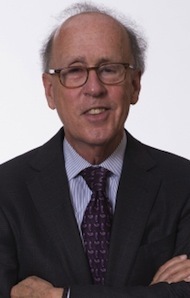Economics graduate to discuss strategies for balanced Sino-American relations
After three decades in which China achieved record economic growth in part by feeding the insatiable U.S. appetite for consumer of goods, Wall Street economist Stephen Roach (’68 BA, economics) sees an unhealthy codependency that could easily spiral out of control into a new trade war and other doomsday scenarios.

Stephen Roach
“Both economies are currently in states of unsustainable disequilibrium, in which they face mounting pressures for rebalancing,” Roach writes in his latest book, “Unbalanced: The Codependency of America and China.”
Roach will visit UW–Madison to give a free public lecture on Wednesday, April 2, at 5 p.m., in Union South’s Varsity Hall. In his talk, he will focus on how the U.S. and China can “rebalance” their economic relationship toward new identities.
“For China, this will entail a transformation from the producer model to an emerging consumer society,” Roach says. “The United States must move in the opposite direction, pulling back from excess consumption and rediscovering its competitive prowess by tilting its growth model toward capital spending, human capital and export-led growth.”
Roach, now a senior fellow at Yale University’s Jackson Institute for Global Affairs, spent the bulk of his career with New York-based investment bank Morgan Stanley, where he served as chief economist and later chairman of Morgan Stanley Asia. In 2011, the Wisconsin Alumni Association honored him with its Distinguished Alumni Award.
He switched from engineering to economics as a UW undergraduate in the 1960s, then went on to earn his Ph.D. in economics at New York University.
“Wisconsin gave me the tools and a big palette,” he says. “But in the end, the painting is up to you and the experiences you bring to the composition of your own journey. That sounds sort of corny, but it was true for me.”
Roach was invited to campus by fellow economics alumnus Wade Fetzer, who currently chairs the Wisconsin China Initiative (WCI) Advisory Board. Launched in 2007, the WCI serves as the contact point for information about UW–Madison connections with Greater China and brings together cross-disciplinary faculty, alumni, and leaders in business and government.
At its annual meeting in October, the WCI Board expressed interest in bringing alumni with China expertise to campus to, in Fetzer’s words, “increase the China literacy of our undergraduates,” resulting in the “2014 China and Global Economics Lecture Series.”
“Wisconsin gave me the tools and a big palette. But in the end, the painting is up to you and the experiences you bring to the composition of your own journey. That sounds sort of corny, but it was true for me.”
Stephen Roach
Roach’s talk kicks off this series. The second lecture in the series, to be held in October, will feature Nicholas Lardy (’68 BA, economics), senior fellow at the Peterson Institute for International Economics in Washington, D.C.
“The new ‘China and Global Economics Lecture Series’ is a perfect platform for bringing together faculty, staff, students, alumni and business leaders to discuss issues related to China,” says WCI Director Nicole Huang, professor of Chinese literature and visual culture.
College of Letters & Science Dean John Karl Scholz, a former chair of the Department of Economics, will introduce Roach, and Melanie Manion, professor of political science and public affairs, will offer a faculty response to the lecture. The Global Economic Forum, a student organization, will coordinate the question-and-answer session.
The lecture series is coordinated and funded through the Wisconsin China Initiative, which is part of the Division of International Studies. The East Asian Legal Studies Center is a series sponsor partner. Other co-sponsors of Roach’s lecture are the Global Economic Forum, the Center for International Business Education & Research (CIBER), the Chinese Students and Scholars Association, and the Center for East Asian Studies.
– Laurie Dennis



